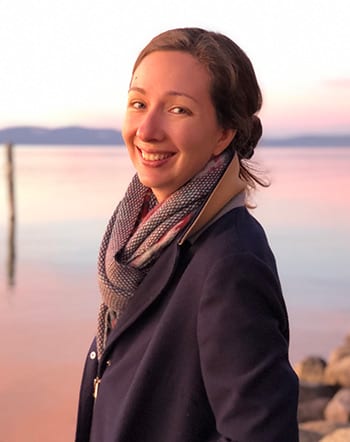By Andrew Cohen

Berkeley Law’s Jurisprudence and Social Policy Program has done it again. For the second consecutive year, a student in the program won the American Bar Foundation Graduate Student Paper Competition from Law & Social Inquiry, an international journal that analyzes law from a socio-legal perspective.
Cristina Violante received this year’s award for Liquidity: Water and Investment in Mandate Palestine, which will be published early next year. Last year, 2015 Berkeley Law graduate and current JSP student Tobias Smith was honored for Body Count Politics: Quantification, Secrecy and the Death Penalty in China.
The JSP is a unique Ph.D. program for students interested in an interdisciplinary study of legal ideas and institutions, policy analysis and applied research on law-related issues in various fields. It also prepares graduates to teach legal studies and law.
“Legal scholarship has the ability to lead to real and profound change,” Violante says. “But without interdisciplinarity, conversations tend to become siloed and the potential to ask the right kinds of questions is diminished.”
A fundamental objective of the JSP Program is to focus the knowledge and perspectives of the social sciences and humanities on the analysis of law, legal discourses, legal institutions, and law-related policies.
Violante notes that her area of interest, water law, requires an approach that is simultaneously historical, philosophical, and sociological in orientation. “While I’m training to be a historian, having a basic literacy in other disciplines and understanding how they approach and think about the law will only help my research,” she says.
Digging deep
For her prize-winning paper, that research was exhaustive: six years in the making.
It began as her masters thesis in Columbia University’s Middle Eastern, South Asian, and African Studies Department. While studying Arabic in Jordan on a foreign language and area studies fellowship, Violante also started conducting archival research in the Central Zionist Archives in Jerusalem and the British National Archives in London.
Her biggest research challenge was language, Violante says, “given the archives in which I was working and the fact that I am limited to English and an intermediate-level knowledge of Arabic.”
She first became interested in the topic while living in the West Bank in 2011, where she says Palestinians face major restrictions on their freshwater access (Amnesty International reports that they consume one-fourth as much water per capita as Israelis).
“The West Bank is located above three aquifers, and is a naturally fertile area,” Violante says. “Yet Palestinians are not allowed to drill new wells to access that water … Water in many places in the West Bank must be tanked in, and it is not uncommon to see Israeli settlements with green lawns and swimming pools next to Palestinian villages that have only a single well.”
Violante has presented portions of her paper at conferences, including last year at the JSP Program’s annual Gateway Conference, which enables first-year program students to workshop their scholarship-in-progress.
“It was an incredibly helpful forum for me,” she says. “It pushed me to refine the paper and sharpen the argument, and allowed me to receive feedback both from my peers and from faculty.”